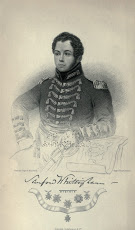Samuel Ford Whittingham
| Sir Samuel Ford Whittingham | |
|---|---|

Sir Samuel Ford Whittingham
|
|
| Born | 29 January 1772 Bristol |
| Died | 19 January 1841 Madras Presidency, British India |
| Buried at | Fort George |
| Allegiance |
Spain |
| Service/branch |
Spanish Army |
| Years of service | 1803-1841 |
| Rank | Lieutenant-General |
| Commands held | Madras Army |
| Battles/wars | Napoleonic Wars |
| Awards |
Knight Commander of the Order of the Bath Knight Commander of the Royal Guelphic Order |
Lieutenant General Sir Samuel Ford Whittingham KCB KCH (1772–1841), whose Christian names were contracted by himself and his friends into "Samford", was a British and Spanish army officer during the Napoleonic Wars. Following the conflict he served in the British Army predominately in India.
Whittingham was the elder son and second child of William Whittingham of Bristol. Born in Bristol on 29 January 1772, Samuel Ford was educated at Bristol and was intended for the law. He was determined to become a soldier, but unwilling to oppose his father's wishes during his lifetime, he temporarily entered the mercantile house of his brother-in-law, travelling for it in Spain.
In 1797 he was enrolled at Bristol in the mounted volunteers, a force organised among the wealthier citizens following a threatened French invasion. On his father's death, on 12 Sept. 1801 (aged 60), at Earl's Mead, Bristol, Samford, who was in Spain, became independent, and took steps to enter the army. On his return to England he was gazetted ensign on 20 January 1803. He bought a lieutenancy on 25 February, and was brought into the 1st Life Guards on 10 March the same year. He went to the military college at High Wycombe, and joined his regiment in London towards the end of 1804. Introduced by Thomas Murdoch, an influential merchant, to William Pitt the Younger, the then Prime Minister, as an officer whose knowledge of the Spanish language would be useful, Whittingham was sent by Pitt at the end of 1804 on a secret mission to the Iberian Peninsula, and during absence promoted, on 14 February 1805, to be captain in the 20th Foot. On his return he was complimented by Pitt, and on 13 June 1805 he was transferred to the command of a troop in the 13th Light Dragoons.
...
Wikipedia
